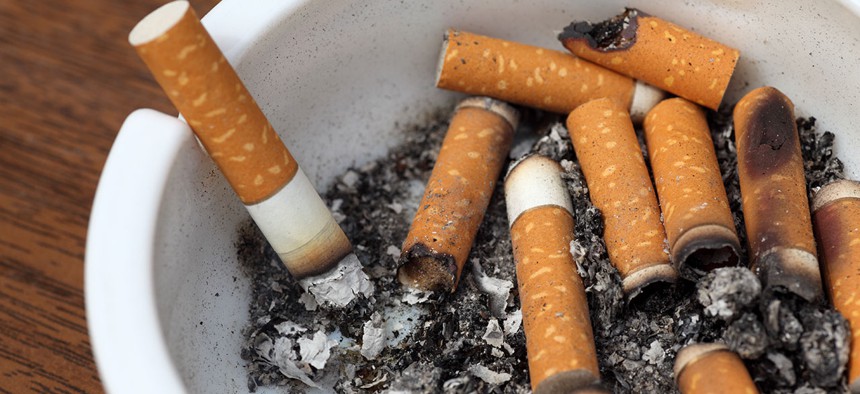
StepanPopov/Shutterstock.com
Should HUD Ban Smoking in Public Housing?
The proposed smoking ban protects vulnerable people, but also imposes more regulations on them.
In one sense, the case for a federal smoking ban in public housing is plain: Smoking is terrible, and smoking bans in public places are good for the public. Most landlords don’t allow their tenants to smoke indoors because smoking is a fire hazard; when it comes to public housing, the federal government is like a super-landlord. Smoking is disgusting, of course. Ask House Speaker Paul Ryanwhat it’s like to move into an office whose previous occupant was a smoker.
At the same time: What the hell! Where do I get one of those Guy Fawkes masks? The the U.S. Department of Housing and Urban Development is proposing to tell residents with very few housing options how to live in their own homes. Moreover, the federal government is stepping into a regulatory realm that is otherwise reserved for state and local government. This would be the only federal smoking ban.
In any event, HUD Secretary Julián Castro went there, proposing a smoking ban that would affect 1.2 million public-housing units across the nation. The rule would require 3,100 public-housing agencies nationwide to implement the rule within 18 months of its adoption. So is it a good idea?
A federal ban on smoking in public housing is a good idea
- It would save the government money. “A 2014 CDC study estimated that prohibiting smoking in public housing would yield an annual cost savings of $153 million, including $94 million in secondhand smoke-related health care, $43 million in renovation of smoking-permitted units, and $16 million in smoking-related fire losses,” reads a HUD release.
- HUD is following the lead of public-housing authorities. More than 228,000 public-housing units nationwide are already smoke-free facilities, either by local ordinance or their own initiative.
- Smoke is a special problem for public-housing projects. Secondhand smoke and thirdhand smoke—that’s the residue of chemicals and toxins that accrues on indoor surfaces—may be more serious problems in public-housing projects due to their age, relatively cheap construction, and general lack of maintenance.
- A smoking ban would protect vulnerable populations. Some 500,000 public-housing units are occupied by the elderly. More than 760,000 children live in public-housing projects. A smoking ban would protect them from secondhand smoke (and in the case of the elderly, themselves).
- Smoking kills people. ’Nuff said.
Yes. I’m for it! It’s time to “Butt Out with HUDTM!” or whatever. But then again...
A federal ban on smoking in public housing is a terrible idea
- It’s an unfunded mandate (for owners). “Housing authorities are struggling to maintain buildings and keep the lights on,” says Amy Glassman, a lawyer who represents public-housing authorities, developers, and other entities who receive funds from HUD. “To add an additional regulatory requirement, regardless of intention, and to do so without adding any funding, is burdensome.”
- It’s an unfunded mandate (for tenants). The HUD rule doesn’t come with any funding for outreach, education, or cessation strategies to help residents quit smoking. That’s mean! Smoking is a potent addiction. While the federal government does want to help, HUD’s ban doesn’t appear to come with a campaign to tell residents that.
- Public-housing agencies are already enacting smoking bans. By HUD’s own accounting, public-housing agencies responsible for one-fifth of the nation’s public-housing stock have already voluntarily adopted smoking bans. (Or local ordinances have required them to.) One way or another, this is a problem that may go away without federal intervention.
- Smoking bans may not be a priority for every public-housing agency.If you ask public-housing agencies what they’d like to see from a big federal HUD campaign, I’d bet the answer would not be a smoking ban.
- A smoking ban might potentially be a hardship for some residents.Alright, this one may be a stretch, but: Mobility-impaired smokers who can’t or won’t quit smoking will need to go outside any time they want to smoke. Which sucks for them. But worse, it could mean that they’ll just decide, nah, I’ll keep smoking inside. And that sets up a serious conundrum.
- Like, is the federal government supposed to evict low-income residents for smoking? Presumably, public-housing agencies would fine scofflaws first, but what happens if they won’t quit?
Now, I made calls to the Tobacco Control Legal Consortium as well as to thePublic Housing Authorities Directors Association but didn’t hear back. There are bound to be more reasons, for or against, that I haven’t considered. But one sidebar concern makes me wonder.
What’s up with marijuana?
HUD has issued at least two memos about marijuana use in public housing—one in February 2011 and one in December 2014. Here’s the deal:
- Public-housing applicants can’t use marijuana, even if it’s legal. Even people with legal prescriptions for medical marijuana can’t be admitted into public housing or housing-choice voucher programs.
- Public-housing residents can maybe use marijuana if it’s legal—it depends. Public-housing agencies can terminate assistance for medical-marijuana users, but they aren’t required to by federal law. Discretion falls on the agency or owner.
- Public-housing agencies are required to write rules that enable owners to evict residents for using marijuana. Still, no one is requiredto evict anyone for using marijuana. There just needs to be a rule on the books saying that it can happen. It’s confusing.
In Washington, D.C., at least, there’s an awesome conundrum. According to the city, it’s legal for residents to smoke marijuana indoors. But according to HUD, public-housing residents cannot smoke marijuana inside—even though it’s illegal under D.C. law for them to smoke pot outside. Meanwhile, it’s legal for D.C. residents to smoke tobacco inside their private homes, but the new rule would make that illegal, too, for public-housing residents.
It’s almost as if low-income residents are subject to more excessive regulation than others.
(Image via StepanPopov/Shutterstock.com)






